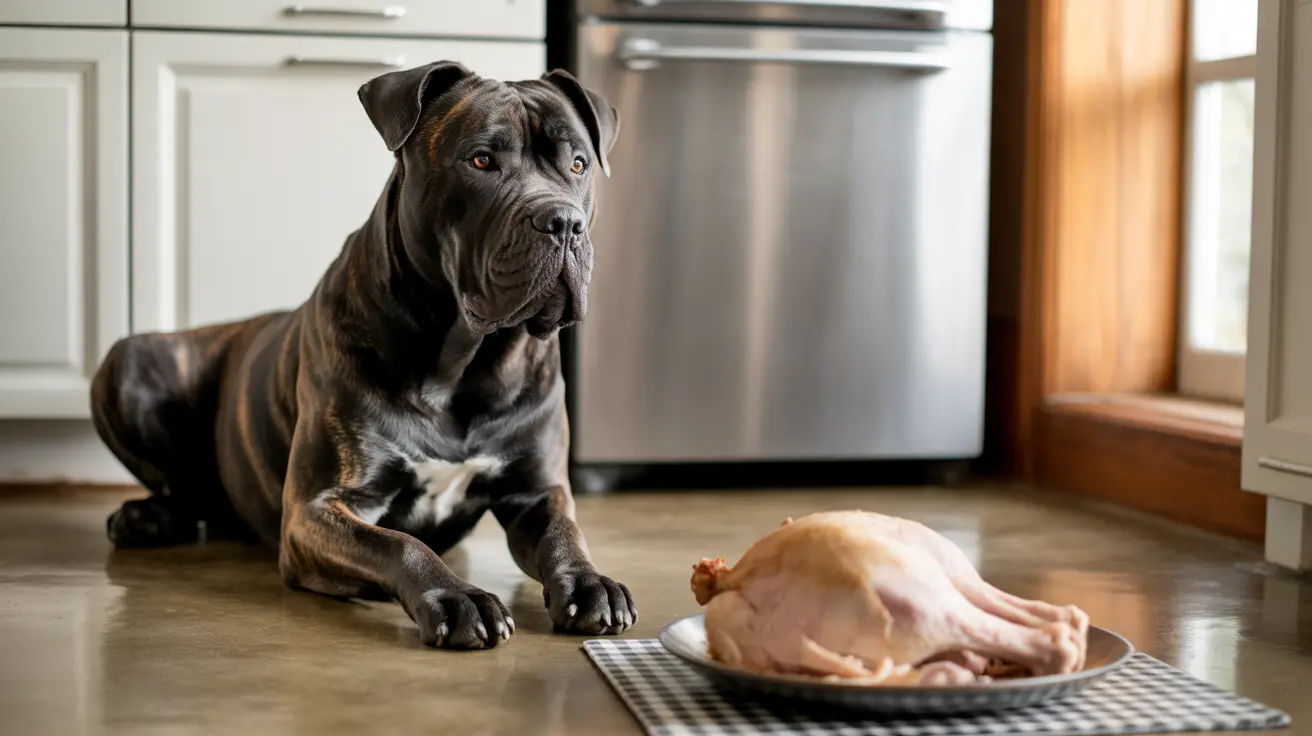Como Preparar Peru para Cachorro de Forma Segura
O segredo para oferecer peru cozido para cães sem risco está no preparo correto. Siga as recomendações abaixo para evitar problemas:
Instruções de Cozimento
- Remova toda a pele e a gordura aparente
- Cozinhe completamente, sem adicionar nenhum tipo de tempero
- Não utilize óleos ou manteiga no preparo
- Espere esfriar completamente antes de servir
O Que Evitar
- Cachorro pode comer ossos de peru? Não, nunca ofereça ossos de qualquer tipo
- Não sirva pele ou partes gordurosas
- Evite totalmente temperos, especialmente alho e cebola (perigos do tempero no peru para cães)
- Não ofereça caldos ou molhos do peru
Quantidade Segura de Peru para Cachorro e Frequência
Ao introduzir peru na dieta do cachorro, comece com pequenas porções e observe como ele reage. Como referência de quantidade segura de peru para cachorro:
- Cães pequenos (menos de 9 kg): 1-2 pedaços pequenos
- Cães médios (9-23 kg): 2-3 pedaços médios
- Cães grandes (acima de 23 kg): 3-4 pedaços maiores
Lembre-se: o peru é saudável para cachorro como petisco ou complemento alimentar ocasional, nunca como substituto da dieta principal, a menos que o veterinário indique de outra forma.
Sinais de Sensibilidade ou Intoxicação por Peru
Esteja atento a possíveis reações adversas ou alergia de cachorro ao peru. Os principais sinais de sensibilidade ou sinais de intoxicação por peru incluem:
- Desconforto digestivo
- Vômito ou diarreia em cachorro por comer peru
- Letargia
- Sede excessiva
- Reações alérgicas (são raras, mas possíveis)
Considerações Especiais Sobre Peru nas Festas
Durante datas comemorativas, todo cuidado é pouco: cachorro pode comer peru de Natal? Só se for preparado de acordo com as regras já citadas. O risco de peru para pets aumenta nas festas, pois geralmente vai acompanhado de ingredientes inadequados. Jamais ofereça:
- Peru temperado com ervas e especiarias (substâncias proibidas no peru para cães)
- Recheios, acompanhamentos ou farofas
- Pele, molhos ou caldos do peru (cachorro pode comer pele de peru? Não!)
- Ossos do peru, mesmo que sejam restos– cachorro pode comer ossos de peru? Nunca!
Perguntas Frequentes
Cachorro pode comer peru?
Sim, cachorro pode comer peru desde que seja cozido, sem temperos, ossos ou pele, em pequenas porções, como complemento à alimentação principal.
Quais benefícios o peru oferece para cães?
O peru é fonte de proteína magra, vitaminas do complexo B, zinco, selênio e fósforo, importantes para a saúde muscular, óssea e imunológica do cachorro.
Como preparar peru de forma segura para cachorro?
Remova ossos, pele e todo o tempero; cozinhe o peito de peru sem óleo ou condimentos, deixe esfriar e sirva em pedaços pequenos e desfiados.
Cachorro pode comer peru com tempero?
Não. Tempero, especialmente sal, alho e cebola, pode intoxicar o cachorro e afetar o fígado, rins ou intestino.
Meu cachorro pode comer pele ou ossos de peru?
Não. Ossos podem causar obstrução ou perfuração interna, e a pele é rica em gordura, podendo causar pancreatite.
Qual quantidade de peru é segura para cachorro?
Ofereça porções pequenas, de acordo com o porte: 1-2 pedaços para pequenos, 2-3 para médios, 3-4 para grandes, sempre com orientação veterinária.
Quais sintomas de alergia ou intolerância ao peru em cães?
Diarreia, vômito, letargia, coceira ou sede excessiva são sinais de intolerância ou alergia e exigem suspensão imediata e avaliação veterinária.
Posso oferecer peru de natal para cachorro?
Somente se for separado antes de adicionar temperos, sem pele, ossos ou acompanhamentos; nunca restos da mesa.
Peru processado ou defumado faz mal ao cachorro?
Sim. Embutidos e carnes processadas possuem muito sal e conservantes, podendo causar intoxicação ou problemas renais.
Como introduzir peru na dieta do meu cachorro?
Comece com pequenas porções, observe reações, nunca substitua a ração; consulte sempre o veterinário antes de mudanças alimentares.
Quais alternativas de carnes saudáveis para cães?
Além do peru cozido sem temperos, frango e peixe (sem espinhas e condimentos) podem ser oferecidos; consulte o veterinário para opções seguras.






